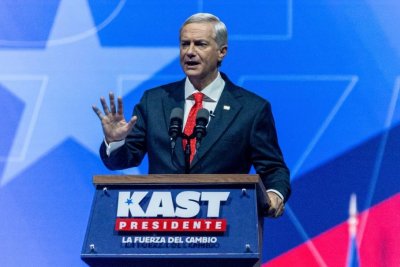Jose Antonio Kast, the Republican Party’s candidate for the Chilean presidency, speaks during a campaign closing event in Santiago, Chile, on Tuesday. Photo by Ailen Diaz/EPA
SANTIAGO, Chile, Nov. 12 (UPI) — Chileans are preparing to vote in Sunday’s presidential election with eight candidates and marked by uncertainty.
For the first time in more than a decade, voting will be compulsory, greatly expanding the electorate and potentially reshaping a race that, according to recent polls, remains tight between the government’s candidate, the communist Jeannette Jara, and far-right leader José Antonio Kast.
Chilean President Gabriel Boric is not eligible for re-election because the constitution prohibits consecutive four-year terms.
An expected surge in voter turnout — after years of sustained abstention — adds an unpredictable element to the outcome and will test the parties’ ability to mobilize a broader and more diverse electorate.
René Jara, a political science professor at the University of Santiago, told UPI it will be an unprecedented election. As the first with compulsory voting in many years for more than 15 million registered voters, “there could be quite a few surprises,” he said.
“The expansion of the potential electorate hides several forms of silent voting, representing voices that in the past did not regularly take part in elections.”
Chilean law prohibits the publication of polls during the 15 days before an election. According to the latest surveys, Jara was leading in voter preference, but not by enough to avoid a runoff.
Her level of support also most likely would fall short of securing victory in the second round, scheduled for Dec. 14.
The same polls indicate that any opposition candidate who advances to the runoff most likely would win the presidency.
The right enters the election with three strong contenders. Kast, leader of the Republican Party, appears to have the best chance to win. Evelyn Matthei, a former minister under President Sebastián Piñera, represents the traditional right, and libertarian Johannes Kaiser has emerged as one of the race’s biggest surprises.
According to projections, Jara would lose to Kast in a runoff by about 12 points (36% to 48%), by 10 points to Matthei (33% to 46%), and by five points to Kaiser.
“This election is significant because of the fragmentation of Chile’s right wing. Traditionally, it was a bloc that faced elections in a unified way,” political scientist Hernán Campos, of Diego Portales University’s School of Political Science, told UPI.
He said that since the 2017 presidential election, and especially after 2021, increasingly extreme tendencies have taken root within the opposition.
Although Chile’s pre-election polling ban has prevents measuring public opinion after the close of the campaigns and the candidates’ performance in the final debates, Campos said he believes it is highly likely that the right will win the presidency.
He also sees the possibility that this bloc could secure a majority in the Chamber of Deputies and the Senate.
“This would open the door for them to carry out deeper reforms that could transform aspects of Chile’s institutions and public policy orientations that have defined the country’s political life over the past 20 years,” Campos said.
Public debate during the campaign centered on three main issues: security, migration and the economy.
Pressure to curb crime and control the northern border has co-existed with concern over employment, inflation and pensions, while deeper issues such as gender equality, low birth rates and historical memory continue to divide the country.
In this context, the return of compulsory voting could reshape Chile’s political landscape by bringing back to the polls voters who have long been absent from the democratic process.
